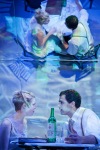Caesar and Dada
Art about art. Fiction about fiction. Poetry about poetry. Theater about theater. Isn’t it interesting how interesting that can be? (And can I get an amen from Gertrude Stein?)
WSC Avant Bard, that intrepid, now nomadic troupe that brazenly revisits and rethinks classics, has just mounted a spiffy production of an intriguing new play—one that toys with ideas and spaces in our head we didn’t know were there. It’s a two-acter called Caesar and Dada, by local playwright Allyson Currin, directed by Lee Mikeska Gardner, and it’s broadly about—wait for it—six characters in search of their dada.
The paddleball tethered to Avant Bard’s usual oeuvre is an oddball story about a troupe of theatrical-realism devotees in post-WWI Zurich (pretentiously dubbed the Theater of Truth), who are mounting a production of Shakespeare’s Julius Caesar. Lily (Mundy Spears), a winningly uppity American outsider, drops in, finagles Frank (Sun King Davis), the talented but tyrannical director, into a brazen retooling of the company’s presentational style, and before long we and the six characters are dabbling in alternate isms: symbolism, expressionism, finally dadaism.
The point of the post-war timeframe—historically dada’s cradle—becomes movingly clear in a long speech to Lily by one of Truth’s actors, Tristan (Andrew Ferlo), who has returned from battle with what today we call PTSD: When all hell breaks loose in wartime, all meaning loses its moorings as well. The restraints of realism fail and fall apart. There’s no escape from war-worn meaninglessness except into more meaninglessness. The experience of emptiness can find reflection only in form without content.
Speaking of reflection, the set is a marvelous contraption by co-director Steven T. Royal Jr. featuring a vast  mirror rigged at a 45-degree angle to the stage so that we see the whole first act face on and from above, as if all is relative, nothing is what it seems. You can see its dazzling effect at left in the scene between Lily and Tristan. Fun animations and clever projections by Tewodross Melchishua also punch up points in the play’s art history refresher. The originality of the script appears to have inspired spurts of novelty all over the place.
mirror rigged at a 45-degree angle to the stage so that we see the whole first act face on and from above, as if all is relative, nothing is what it seems. You can see its dazzling effect at left in the scene between Lily and Tristan. Fun animations and clever projections by Tewodross Melchishua also punch up points in the play’s art history refresher. The originality of the script appears to have inspired spurts of novelty all over the place.
With actors making head-spinning transformations from scene to scene, moment to moment, and style to style, one can sometimes feel uncertain what to hold on to, as if one has lost one’s bearings. Or perhaps more precisely: as if one’s theatergoing experience has been incrementally dada-ized.
But there’s a really compelling relationship story line that anchors everything. It’s the dramatic tension between the domineering Franz (whom Lily accurately calls a bully) and the outsider Lily (who takes no bull). The way Lily stands up to Franz and steadily transforms him is remarkable to behold—not least because Currin handles it so, well, realistically. We get sympathetic male coworkers advising Lily to cower before Franz’s authority just as they do—the bumptious Dominic (Joe Feldman) and the sage Alfred (Mario Baldessario). We even get the threatened, claws-out female coworker Anna (Megan Dominy) trash-talking Lily for her presumption and gumption. It’s like a tale out of every workplace since women broke out of the secretarial pool.
There’s a heck of a lot to appreciate here. And there’s a lot to reflect on later. Literally and metaphorically, it holds a mirror up to life.
